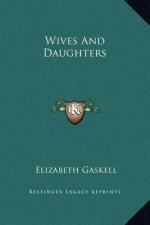of the mourning survivors. Yet, perhaps, this
injury may be only temporary or superficial; the judgments
so constantly passed upon the way people bear the
loss of those whom they have deeply loved, appear
to be even more cruel, and wrongly meted out, than
human judgments generally are. To careless observers,
for instance, it would seem as though the squire was
rendered more capricious and exacting, more passionate
and authoritative, by his wife’s death.
The truth was, that it occurred at a time when many
things came to harass him, and some to bitterly disappoint
him; and she was no longer there to whom he
used to carry his sore heart for the gentle balm of
her sweet words. So the sore heart ached and
smarted internally; and often, when he saw how his
violent conduct affected others, he could have cried
out for their pity, instead of their anger and resentment:
’Have mercy upon me, for I am very miserable.’
How often have such dumb thoughts gone up from the
hearts of those who have taken hold of their sorrow
by the wrong end, as prayers against sin! And
when the squire saw that his servants were learning
to dread him, and his first-born to avoid him, he
did not blame them. He knew he was becoming a
domestic tyrant; it seemed as if all circumstances
conspired against him, and as if he was too weak to
struggle with them; else, why did everything indoors
and out-of-doors go so wrong just now, when all he
could have done, had things been prosperous, was to
have submitted, in very imperfect patience, to the
loss of his wife? But just when he needed ready
money to pacify Osborne’s creditors, the harvest
had turned out remarkably plentiful, and the price
of corn had sunk down to a level it had not touched
for years. The squire had insured his life at
the time of his marriage for a pretty large sum.
It was to be a provision for his wife, if she had
survived him, and for their younger children.
Roger was the only representative of these interests
now; but the squire was unwilling to lose the insurance
by ceasing to pay the annual sum. He would not,
if he could, have sold any part of the estate which
he inherited from his father; and, besides, it was
strictly entailed. He had sometimes thought how
wise a step it would have been could he have sold
a portion of it, and with the purchase-money have drained
and reclaimed the remainder; and at length, learning
from some neighbour that Government would make certain
advances for drainage, &c. at a very low rate of interest,
on condition that the work was done, and the money
repaid, within a given time; his wife had urged him
to take advantage of the proffered loan. But
now that she was no longer here to encourage him,
and take an interest in the progress of the work, he
grew indifferent to it himself, and cared no more to
go out on his stout roan cob, and sit square on his
seat, watching the labourers on the marshy land all
overgrown with rushes; speaking to them from time
to time in their own strong nervous country dialect:




